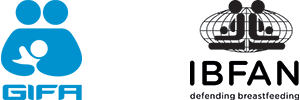Health and nutrition claims about infant formula can enhance the perceived benefits of formula over breastfeeding and thereby undermine breastfeeding. Cheung et al have examined the evidence for the health claims made for infant formula by the baby food industry in 15 countries. The most common claim types were “helps/supports development of brain and/or eyes and/or nervous system”, “strengthens/supports a healthy immune system”, “helps/supports growth and development”, “easy to digest”, and “dietary management of allergy including cow’s milk allergy”.
Of the 1884 claims examined, only 58 cited registered clinical trials to substantiate the claim. Of these 58, 46 are considered to be at “high risk of bias” by the risk of bias analyses performed by the authors. Most registered trials (88%) had formula industry funding and/or formula industry affiliated authors.
Cheung et al conclude: “We have identified a high prevalence of claims on infant formula products in multiple countries that seem to have little or no scientific substantiation. These findings support calls for a revised regulatory framework for breast milk substitutes to better protect consumers and avoid the harms associated with aggressive marketing of such products.”
Nigel Rollins from the WHO states in an accompanying editorial: “In a busy world, health professionals and families lack the time to properly scrutinize claims. Industry is unlikely to change its practice given shareholder interests. Self-regulation has not worked, and responsible, ethical marketing by the formula industry seems unlikely. Regulatory authorities must therefore decide whether the use of such apparently misleading evidence is acceptable or hold the formula industry to higher standards, require better products based on high quality evidence, and review standards. On the basis of this study, governments and regulatory authorities must commit the necessary time and attention to review the claims of formula milk products and the evidence provided and thereby protect infants and parents from commercial interests.” BMJ 2023;380:p310
Cheung, K.Y., et al. (2023) Health and nutrition claims for infant formula: international cross sectional survey. BMJ 2023;380 doi.org/10.1136/bmj-2022-071075
You may also read
- Newspost on abusive Marketing
- WHO Report and the Lancet : WHO reveals shocking extent of marketing
